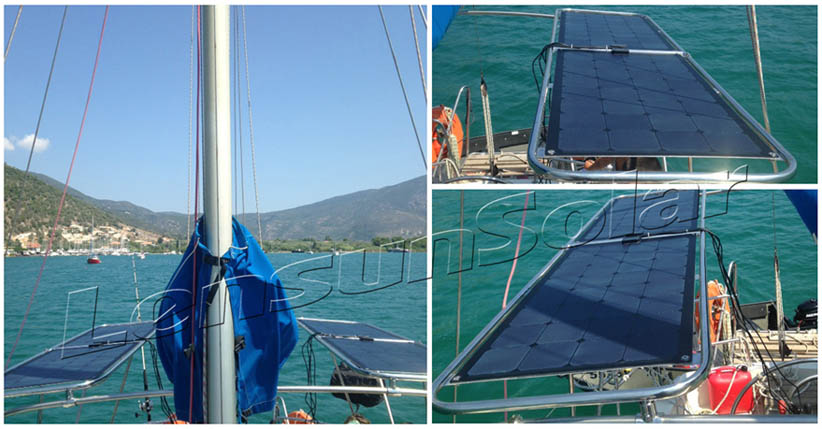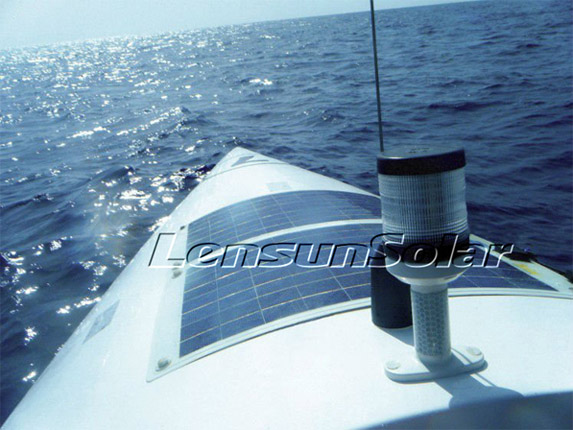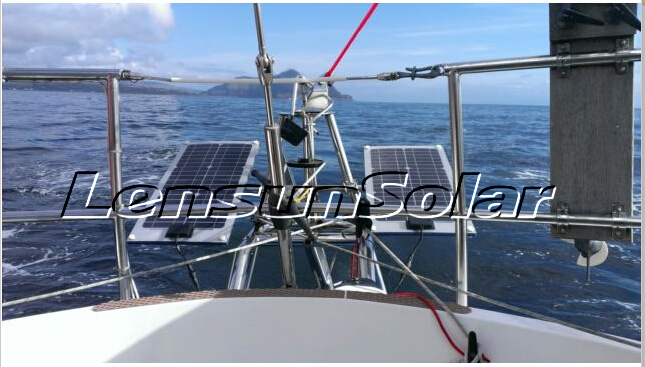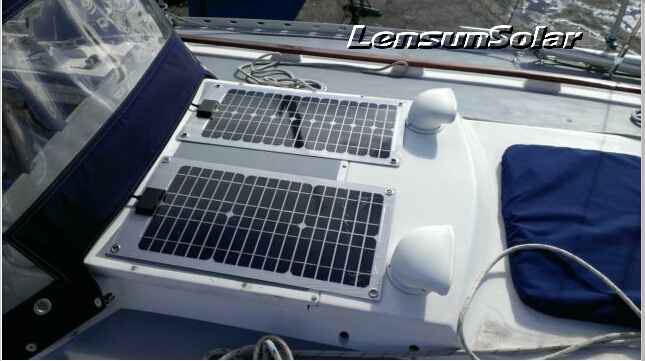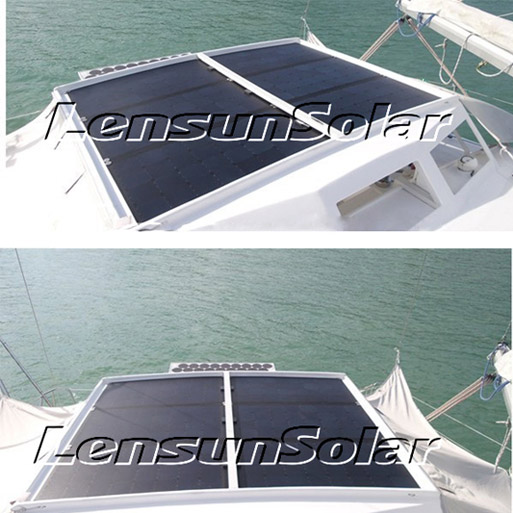Flexible Solar Panels on boats – Everything You Need to Know!
Do you want to add flexible solar panels on your boat, or wonder how to make the most of those you already have? How to keep your batteries top up is an ongoing problem for boat owners. Is it enough to run your engine from time to time and put up with the huge inefficiency, effects on long term engine performance? So, you should fit an independent means of charging your battery, such as wind generator or solar panels.
Flexible solar panels are an increasingly popular option, but how to choose a fit flexible solar panel for your system? How can you possibly predict how much sun you’re going to get during the season, or how much power your panel will produce if it’s not exactly aligned with the sun? But provided you accept a statistical approach using established databases then prediction is easier than you think.
The first step is to work out your boat’s power requirements. All you have to do is add up all the energy in Watt-hours used by each device on your boat, such as the fridge, lights, computers and so on. Energy is power accrued over time so if power is measured in Watts, energy is Watt-hours. Most of these devices will have a badge which will tell you what the power requirements are in Watts, so you just multiply this number by the number of hours per day the device is actually working. When making your estimates, remember that the fridge will work harder when the sun is out and the temperature gets up.
Once you have your energy requirements worked out, In reality it is recommended that you always overrate your requirements by at least 20%.
Next, you need to decide how much of this requirement should be met by the solar panels. You figure out how much power you will need each day. If you are running with a 12V fridge, this is likely to being the highest energy consumer. You can check your 12V fridge operating instructions or website for this information.
Solar panel kits are rated with a nominated Power Rating in Amps. This rating is a ‘per hour’ rating. You multiply this Power Rating by the number of hours of charging available per day and you have the amount of ‘Amphours’ available per day. So....
Equation:
Solar Power (Amps / Hour) = Total Power Needed Each Day (Amp hours) / Charging Time (Hours)
Example:
You have a fridge and 2 LED lights that use 20Amp hours per day and you get 5 hours of sunlight per day for charging. You'll need at least 20/5 = 4 Amps / Hour capacity from Solar Panels.
(This is a simple, theoretical calculation. In the real world you may not get 5 hours at full charge so it can be safer to use a safety factor and double your solar panel Power Rating required to make sure you have enough power - in which case you'd need a Solar Panel System with Power Rating of at least 8 Amps).
Where could you put your panels?
A good condition to install your solar panels is very important.
If you spend more time on board and need to get the best from your panels, monocrystalline panels will give more power from the same space –we replaced a 80W bank of amorphous panels with 200W of monocrystalline panels in the same area. But with higher efficiency comes higher sensitivity to poor mounting conditions, so if you want the best from your panels, you need to do your utmost to ensure they are not shaded, and also that they are tilted as close to a right-angle to the sun as possible.
How much space do you have?
One of the reasons we like to supply a range of different manufacturers panels is to provide lots of different sizes. (By that we mean width, length, thickness and power rating).
You can also add panels together to get the overall size you need. So if a 120W panel is too large in the area, but you have room to install two 60W panels side by side, then this idea would be better for one 120W.
And Lensun Custom Service is also a good choose. We provides custom service to our customers, which will greatly save your time and cost. With a professional Research and Develop team, we can provide suitable products according your requirements.
This is ideal for application where standard solar panels fall short due to standardized sizes and mounting options.
How much power do you really get from your solar panel?
When we revisit the relationship between the nominal power of a solar panel, what do you really get? As what we know, The test conditions are an insolation of 1,000W per square metre at 25°C. So if you get a sunny day that insolates your 100W panel at 1kW/m^2, then you have the potential to get 100W output for a short time around solar noon. But the energy over 24 hours will be below this owing to the declination of the sun over the course of the day. This can be partly remedied with a tracking panel, but as the sun declines the light has to pass at a more oblique angle through the atmosphere, hence losing power. The insolation will also be affected by your latitude, and by any form of shading or scattering from atmospheric dust, haze or cloud.
And you also need to calculate some other system losses besides the above intrinsic losses, such as temperature, cables, regulator and shading problem. If you do the sums the unavoidable losses on a new panel operating at 65°C are typically 40%. That is, 100W panel is therefore only putting out 60W, and that’s only for a few hours. If you really need every scrap of power, then you need to find a way to keep the panel cool and you need to invest in an MPPT regulator. As the panel gets older it’s performance will drop off even more. All a bit depressing, isn’t it?
We have to say, though, that in your particular installation on the boat, the output is better than theory would suggest. You regularly get more than 10A from your 200W panels, and your highest recorded value maybe up to 170W, which suggests that these loss figures are conservative.
How to tilt solar panels to help you catch substantially more power?
To achieve the greatest efficiency from a solar panel, it must be properly placed and pointed with respect to the sun's position in the sky. Solar panels deliver the most power when the surface of the panel catches the sun's rays coming straight into the plate. This is to say that to get the full benefit of the solar panel, it needs to be positioned so that it is 90° to the sun at any given moment (at its zenith).
You can try to swing angle to track in azimuth – but of course we can’t always do so.
So then, if you are not going to have a tracking system for your solar panels, at what angle of tilt should you install them? There is no iron-clad rule for this, but there are numerous offerings. Here is one basic concept that has many followers. If you're installing your solar panels in a fixed position:
• And want the best results for year around use, install them at the angle of your location's latitude.
• And want the best results during winter, install them at the angle of your location's latitude plus 10°.
Welcome to visit our other installation cases of Lensun Flexible solar panels and get more information about how to install your solar panels.
The Gallery of Marine Flexible Solar Panels Installations, Lensun Solar Energy
Erfahrungsbericht 50W Solarmodule 440*880 von Lensunsolar from www.t4forum.de
Building a Portable Solar Panel for RV Boondocking from LoveYourRV, Lensun Solar
Lensun Semi-Flexible 100 Watt Solar Panel Review and Video from LoveYourRV
Sharing Michael’s experience with the Lensun solar panel on ybw forum. Lensun Solar
Please let us know if you need any more information, You can contact us via email or call us in the from Mondays to Fridays.
Contact information
www.lensunsolar.com
Tel: US +1 720-608-1288
China: +86 15759769602
Whatsapp: +86 15759769602
Skype: lensunsolar
Email: info@lensunsolar.com, lensunsolar@gmail.com

